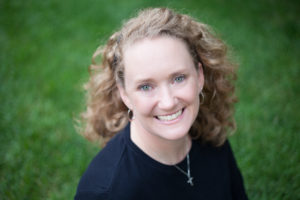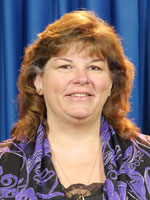 Danene Fast, Assistant Faculty, Clinical
Danene Fast, Assistant Faculty, ClinicalDanene Fast: Orientation & Mobility Program FY21-22 $150,303
 Danene Fast, Assistant Faculty, Clinical
Danene Fast, Assistant Faculty, ClinicalCollege of Education and Human Ecology
 Danene Fast, Assistant Faculty, Clinical
Danene Fast, Assistant Faculty, Clinical Rebecca Parker, Program Lead of Learning, School Leadership, & Professional Development
Rebecca Parker, Program Lead of Learning, School Leadership, & Professional DevelopmentThis project supports new career technical education teachers within rehabilitation and corrections through services including assistance with license program enrollment, coursework continuation, classroom observation and feedback. Teachers are also assisted with the license process for the required end-of-resident education assessments. The project team provides professional development opportunities to other groups within the adult correctional field as well, including mentor groups, adult education programs, and other entities seeking career technical licensure information and teaching expertise. The program offers career and technical education experts with teacher education proficiency to prepare these experts to update, maintain, and deliver materials used to train the teachers enrolled in the program. The team has dedicated associates to develop and present curriculum packages and educational instruction with detailed assessment, evaluation, and standards to meet the needs of the licensure coursework.
 Donald Fuzer, Early Head Start Principal Investigator
Donald Fuzer, Early Head Start Principal Investigator Martha Belury, Professor, Human Nutrition
Martha Belury, Professor, Human NutritionApproximately one in four adults in the US have non-alcoholic fatty liver disease (NAFLD), a condition that accompanies central obesity, type 2 diabetes and other cardiometabolic diseases plaguing people in the United States. Therapies that reduce fat accumulation in the liver also reduce risk for cardiometabolic diseases; yet, other than weight loss, there lack effective lifestyle therapies that effectively and safely reduce ectopic lipid accumulation in the liver. Dietary oils rich in the bioactive fatty acid, linoleic acid (LA), are reduce waist circumference or visceral adipose, improve glycemic control or insulin sensitivity and reduce risk for type 2 diabetes. Our central hypothesis is that soybean oil supplementation reduces ectopic fat in the liver without altering total body weight while improved cardiometabolic risk markers in adults with NAFLD.
 Christopher Zirkle, Associate Professor, Department of Educational StudiesChristopher Zirkle
Christopher Zirkle, Associate Professor, Department of Educational StudiesChristopher ZirkleThis grant from the Ohio Department of Education provides funding to support the licensure program in career and technical education in Workforce Development and Education. Activities funded by the grant include a summer workshop for new career-technical education teachers and outreach and technical assistance to more than 30 Ohio school districts, including onsite teacher mentoring.
 Dean Lillard, Professor, Consumer Sciences
Dean Lillard, Professor, Consumer SciencesThe project will explore the economic and social effects the mitigation policies and information environment that COVID-19 spawned. We will link those policies to data from ongoing household-based panel studies from 10 countries and rich administrative data from an eleventh. We will exploit the substantial intra and inter-country temporal and geographic variation in non-pharmacological intervention policies induced by the COVID-19 disease. That variation, coupled with pre-COVID baseline levels or long-running trends in the outcomes we will study, will identify the effects of the mitigation policies. Project Details
 Laura Justice, Professor; Executive Director of the Crane Center for Early Childhood Research and Policy (CCEC)
Laura Justice, Professor; Executive Director of the Crane Center for Early Childhood Research and Policy (CCEC) Laura Justice, Professor; Executive Director of the Crane Center for Early Childhood Research and Policy (CCEC)
Laura Justice, Professor; Executive Director of the Crane Center for Early Childhood Research and Policy (CCEC)In the first study to use the innovative technology of radio frequency identification and voice recorders to analyze preschoolers’ social networks over time, faculty experts in early childhood development, engineering, physics and psychology from three universities will collaborate to examine a central research question: To what extent do peer social networks — that is, small groups of children — influence children’s language development in inclusive preschool settings over the course of an academic year? Knowledge gained from this study will help create an intervention for use by children’s peers to support more inclusive preschool classrooms, particularly for children with disabilities or language impairment. The researchers will also study how children’s social-emotional development is affected through peer social networks. Leveraging Sensing Systems in Early Education Project Details
(PDF)
Links to a PDF document.
 Barbara Boone, Program Director of Family Engagement
Barbara Boone, Program Director of Family EngagementThe CETE Family Engagement Program team is partnering with The Ohio Education Leadership Learning Consortium of the greater Cleveland area in the development of an online toolkit of resources for families. For this project, CETE will gather stakeholder input from families of school age children in the greater Cleveland area along with input from education and organization leaders. Building upon these insights and incorporating research based practices, the toolkit components will be developed and catalogued. The toolkit will be available to families, the Urban League, area schools and community organizations to equip and empower families as active partners in advocating for their child’s education and for equity and quality in the education system.
 Rhodesia McMillian, Postdoctoral Scholar
Rhodesia McMillian, Postdoctoral ScholarBelieve it or not, the term “education” cannot be found in the United States Constitution. There is, however, an inference of education written in the 14th Amendment. Education has primarily been the responsibility of the states and litigation relative to student’s right to education has traditionally been remanded to the states and lower courts. On April 23, 2020 the Sixth Circuit Court of Appeals ruled—in the case of Gary B. v. Whitmer—that, according to the United States Constitution, students have “a fundamental right” to a “basic minimum education.” This decision sets resounding precedence across other court circuits; inspiring the foundation for states to revise public school funding policies. Similarly, cases such as Cook v. Raimondo and Indigo Williams, et al. v. Phil Bryant et al have also centered the vital query—do American students have a constitutional right to education? This study is significant for examining the shifting jurisprudence toward determining if American students have a constitutional right to education.
Office of Research, Innovation and Collaboration (ORIC)
153 Arps Hall
1945 N. High St.
Columbus, OH 43210
8 a.m. to 5 p.m.
Monday–Friday
Phone: (614) 247-2412
Email: EHE-office_of_research@osu.edu